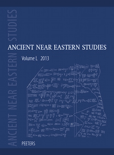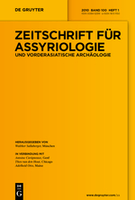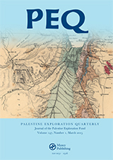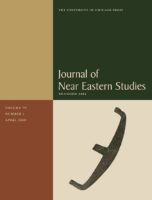
Ancient Near Eastern Studies
Scope & Guideline
Connecting Cultures: A Deep Dive into the Ancient Near East
Introduction
Aims and Scopes
- Archaeological Research:
The journal publishes studies that explore archaeological findings from various sites across the Near East, aiming to uncover the historical and cultural contexts of ancient civilizations. - Cultural and Historical Analysis:
Papers often analyze cultural practices, societal structures, and historical developments in ancient Near Eastern societies, shedding light on their complexities and interconnections. - Linguistic Studies:
A significant focus is placed on the languages of the Near East, including studies on ancient inscriptions and the evolution of language contact, contributing to our understanding of communication and cultural exchange. - Interdisciplinary Approaches:
The journal encourages interdisciplinary methodologies that combine archaeology, anthropology, history, and art history to enrich the analysis of ancient Near Eastern cultures. - Thematic Studies on Specific Civilizations:
There is a consistent focus on major civilizations such as the Phoenicians, Urartians, and others, exploring their contributions to the broader ancient world.
Trending and Emerging
- Environmental Archaeology:
Recent publications have increasingly addressed topics related to environmental changes and their impacts on ancient societies, highlighting the relevance of climate and geography in historical narratives. - Technological Studies in Archaeology:
There is a growing trend towards incorporating technological analyses, such as least-cost path analysis and material studies, which enhance our understanding of ancient procurement and resource management. - Cultural Interactions and Exchange:
Emerging themes include the study of cultural interactions across regions, emphasizing the interconnectedness of ancient civilizations and how they influenced one another over time. - Reassessment of Historical Narratives:
Recent papers are increasingly focused on re-evaluating established historical narratives, particularly those related to significant figures or events in ancient Near Eastern history, encouraging a critical reassessment of the past. - Focus on Lesser-Known Sites:
There is a noticeable increase in research dedicated to lesser-known archaeological sites, providing new insights into regions and cultures that have historically been underrepresented in scholarly discourse.
Declining or Waning
- Medieval Arabic Traditions:
Papers related to medieval Arabic traditions, such as the exploration of 'Jus Primae Noctis', have become less frequent, indicating a waning interest in this specific historical context within ancient studies. - Hellenistic Influence:
The focus on the Hellenistic period, particularly in relation to the Near East, seems to be diminishing, as fewer papers explore this era compared to previous years. - Gender Variance Studies:
Although gender studies were once a vibrant topic, recent publications show a reduction in the exploration of gender variance in ancient contexts, suggesting a shift toward other pressing themes.
Similar Journals

Lucentum
Empowering Scholars, Enriching MindsLucentum is a distinguished open-access journal published by Universidad de Alicante, focusing on the interdisciplinary fields of Archeology, History, and Paleontology. Since its inception in 1982, it has established itself as a vital platform for scholars and researchers to disseminate their findings, contributing significantly to the academic landscape in Spain and beyond. The journal's notable rankings, including Q1 status in History and Q2 in Archeology, reflect its commitment to high-quality scholarship and rigorous peer review. With an impressive impact factor and recognition in Scopus, Lucentum serves as an essential resource for professionals, students, and historians, fostering a deeper understanding of cultural and historical contexts through a wealth of interdisciplinary research. The journal continues to embrace open access, ensuring that critical knowledge is freely available to the global research community.

BULLETIN OF THE AMERICAN SOCIETY OF PAPYROLOGISTS
Advancing Scholarship in Ancient ManuscriptsThe Bulletin of the American Society of Papyrologists is an esteemed journal dedicated to advancing the field of papyrology and related studies in archaeology and history. Published by Peeters, this journal offers a rich array of scholarly articles that delve into the analysis and interpretation of ancient manuscripts and inscriptions, shedding light on historical contexts and cultural nuances. Its impressive impact factor places it in the Q1 category for history and Q2 for archaeology in the 2023 rankings, affirming its significance within the academic community. Though not an open-access publication, the journal remains accessible to researchers and institutions, fostering a collaborative environment for sharing discoveries and scholarly dialogue. With its publication history dating back to 2002, the Bulletin continues to be an essential resource for scholars, historians, and students interested in the complexities of ancient texts and civilizations.

Gerion-Revista de Historia Antigua
Advancing Knowledge in Archaeology and HistoryGerion-Revista de Historia Antigua is a prestigious academic journal published by UNIV COMPLUTENSE MADRID, SERVICIO PUBLICACIONES. Since its inception in 1983, this Open Access journal has been a vital platform for researchers and scholars in the fields of Archaeology, History, and Classics. Based in Madrid, Spain, the journal promotes rigorous scholarship and dissemination of knowledge covering a broad spectrum of ancient history and artifacts. With its impressive quartile rankings—Q1 in Classics and Q2 in both History and Archaeology—Gerion demonstrates a strong commitment to academic excellence, boasting a respectable presence within Scopus rankings. Researchers will find a collaborative space here, as the journal aims to support interdisciplinary dialogue and foster a deeper understanding of ancient civilizations. With its dedicated approach to quality and accessibility, Gerion is essential for anyone engaged in the study of our historical past, making it a valuable resource for students, professionals, and academics alike.

GYMNASIUM
Bridging Timeless Texts and Contemporary TeachingGYMNASIUM, published by Universitätsverlag C Winter Heidelberg GmbH, is an academic journal dedicated to the fields of Classics and Education. Since its inception in 1970, the journal has served as a platform for scholarly discourse, focusing on the intersection of classical studies and educational methodologies. Despite its discontinuation from Scopus coverage post-2021, GYMNASIUM remains an important resource for researchers, professionals, and students, fostering a deeper understanding of ancient texts and their relevance in contemporary educational frameworks. Current rankings place the journal in the Q4 quartile in both Classics and Education categories, reflecting its niche yet significant contribution to these fields. Researchers can access the journal's past issues through various academic libraries in Germany, enhancing interdisciplinary study and promoting scholarship across broader educational horizons.

Zeitschrift fur Assyriologie und Vorderasiatische Archaologie
Illuminating the Rich Tapestry of Near Eastern ArchaeologyZeitschrift für Assyriologie und Vorderasiatische Archäologie, published by WALTER DE GRUYTER GMBH, is a distinguished journal in the field of archaeology, focusing on the rich histories of the ancient Near East and Assyrian studies. Established in 1886, this journal has a venerable tradition of contributing to scholarly discourse, continuously curating impactful research that positions it within the Q2 quartile in the domains of Archaeology and Arts and Humanities as of 2023. With an impressive ranking of #101 out of 413 in Arts and Humanities and #98 out of 354 in Social Sciences within Scopus, the journal serves as a vital resource for researchers, professionals, and students alike. Although it operates under a subscription model, the journal's extensive coverage—from its inception to the present day—ensures a comprehensive exploration of archaeological methodologies, discoveries, and theoretical frameworks. The journal's aim is to advance the understanding of the ancient civilizations of the Near East and to foster scholarly communication across international platforms, making it an essential venue for contemporary archaeological research.

Anadolu Arastirmalari-Anatolian Research
Innovating Insights into Archaeology and HistoryAnadolu Arastirmalari-Anatolian Research, published by ISTANBUL UNIVERSITY, is a prominent open-access journal dedicated to the exploration of history, archaeology, and related fields. Since its transition to open access in 2017, the journal has become a vital resource for scholars and practitioners, facilitating the dissemination of innovative research findings. With a strong focus on the intricacies of Anatolian history and archaeology, the journal has earned notable recognition, achieving a Q1 ranking in History and Q2 rankings in both Archaeology and Arts and Humanities categories as of 2023. This positions it among the foremost journals in its field, providing an essential platform for interdisciplinary research and discourse. The journal's impact factor is evidenced by its significant citation metrics and rigorous editorial standards, aiming to contribute meaningfully to scholarly dialogue and knowledge production. Researchers, professionals, and students alike will find this journal indispensable for understanding the rich tapestry of Anatolian culture and heritage.

Cartagine-Studi e Ricerche
Bridging disciplines to enrich the study of the past.Cartagine-Studi e Ricerche is a distinguished academic journal published by UNIV STUDI CAGLIARI, dedicated to advancing the fields of Archaeology, Classics, and History. With an Open Access format since its inception in 2016, this journal ensures that scholarly research is freely available to a global audience, fostering knowledge dissemination and collaboration among researchers, professionals, and students. Based in Italy, it occupies a vital place in the academic community, holding a Q3 ranking in each of its categories for 2023, showcasing its relevance and impact in the disciplines it covers. Scopus rankings further validate its quality, with impressive percentiles reflecting its significant contributions to the landscape of arts and humanities. Spanning converged years from 2019 to 2024, Cartagine-Studi e Ricerche serves as a crucial resource for those engaged in the study of ancient cultures and historical contexts, inviting innovative research and critical discussions that shape our understanding of the past.

Palestine Exploration Quarterly
Illuminating Cultural Narratives through Scholarly InsightPalestine Exploration Quarterly, published by Routledge Journals, Taylor & Francis Ltd, is a leading academic journal that has been at the forefront of archaeological, historical, and cultural studies concerning Palestine since its inception in 1865. With an impressive Q1 ranking in multiple categories including Archaeology, History, Religious Studies, and Visual Arts and Performing Arts, the journal is recognized for its rigorous peer-reviewed content that significantly contributes to the understanding of cultural heritage and societal dynamics in the region. The UK-based journal offers an array of scholarly articles, reviews, and reports aimed at researchers, professionals, and students in the humanities and social sciences. With a strong focus on advancing knowledge and fostering academic discourse, the Palestine Exploration Quarterly remains an invaluable resource for those engaged in the exploration and interpretation of Palestine's rich history and heritage, now accessible through various academic libraries worldwide.

JOURNAL OF NEAR EASTERN STUDIES
Charting the Course of Cultural and Linguistic EvolutionJournal of Near Eastern Studies (ISSN: 0022-2968; E-ISSN: 1545-6978), published by University of Chicago Press, stands as a cornerstone of academic discourse in the fields of Archaeology, Cultural Studies, and Linguistics and Language. With a prestigious track record that has evolved since its inception and spanning converged publication years from 1968 to 2024, this journal holds an impressive Q1 ranking in Cultural Studies and Linguistics and Language, and a solid Q2 ranking in Archaeology and Arts and Humanities as of 2023. Despite not offering open access, it is widely regarded for its rigorous peer-reviewed articles that contribute significantly to the understanding of Near Eastern history, culture, and languages. The journal's sustained recognition in Scopus rankings, including a notable 30th rank out of 173 in Arts and Humanities, ensures it remains an essential resource for researchers, academics, and students dedicated to exploring the rich tapestry of the Near East. With its base in Chicago, USA, the Journal of Near Eastern Studies continues to foster interdisciplinary collaboration and scholarly excellence.

Vestnik Drevnei Istorii-Journal of Ancient History
Bridging the Past and Present through Rigorous ScholarshipVestnik Drevnei Istorii - Journal of Ancient History, published by the esteemed Russian Academy of Sciences and the State Academy of Humanities (GAUGN), plays a pivotal role in the interdisciplinary field of ancient studies. Fostering scholarly discourse since 2016, this journal is positioned at the crossroads of archaeology, classics, history, and linguistics, as evidenced by its impressive 2023 ranking in multiple categories, including Q1 in Classics and Q2 in History. Although not open access, it serves as a critical resource for researchers, professionals, and students interested in deepening their understanding of ancient societies and cultures. With a reputation for rigor and a commitment to advancing knowledge, the journal aims to disseminate innovative research that sheds light on the complexities of ancient civilizations and their contributions to contemporary society. Current issues and a wealth of archived articles are available for exploration, fostering a rich environment for scholarly engagement.